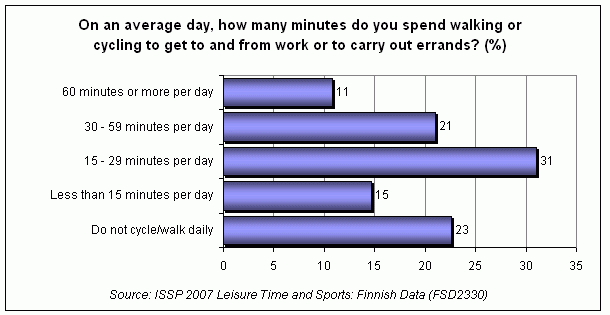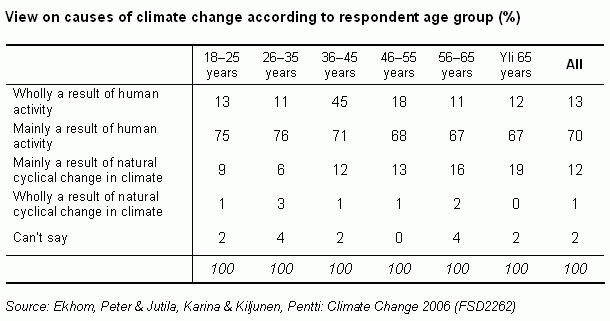Citing Archival Data
Data sources used in research publications must be cited accurately and in sufficient detail. Sources are cited within the text, within tables and graphs, and in publication references.
A citation gives credit to the source and distributor. It also contains copyright information. Other researchers may want to analyse the same dataset and need the bibliographic information provided in the citation to identify and locate the referenced data. Citations appearing in publication references are harvested by electronic social science indexes, providing acknowledgement to the original researchers. Funding agencies can track levels of usage of datasets, thus measuring their impact.
All datasets archived at FSD are electronic data sources. They typically consist of data files, codebooks and questionnaires. The source should be cited in all publications where a dataset or even part of it has been used.
A recommended citation is included in the study descriptions of datasets archived at FSD. Study descriptions are published on the archive's website and in the accompanying codebook. You can copy and use the recommended citation or amend it to be compatible with the citation requirements of the publication.
Citation in publication references
When writing publication references, it is important to give sufficient information about electronic data. The following elements should be included in the citation, as they are important in identifying the data: name of the original creator(s) of data, title of the dataset, year of data collection, version, FSD's archival number, URN identifier, and distributor.
Examples. Datasets with no named author:
Finnish Voter Barometer 1973 [computer file]. FSD1000, version 4.1 (2005-06-10). Gallup Finland [data collection], 1973. University of Helsinki, Department of Political Science & Gallup Finland [producers], 1973. Tampere: Finnish Social Science Data Archive [distributor], 2005. http://urn.fi/urn:nbn:fi:fsd:T-FSD1000
ISSP 2007: Leisure Time and Sports: Finnish Data [computer file]. FSD2330, version 1.0 (2008-03-28). Tampere: University of Tampere. Department of Sociology and Social Psychology & Tampere: Finnish Social Science Data Archive & Helsinki: Statistics Finland [producers], 2007. Tampere: Finnish Social Science Data Archive [distributor], 2008. http://urn.fi/urn:nbn:fi:fsd:T-FSD2330
Sociobarometer 1994 [computer file]. FSD1129, version 1.0 (2002-03-11). Helsinki: Finnish Federation for Social Welfare and Health [producer], 1994. Tampere: Finnish Social Science Data Archive [distributor], 2002. http://urn.fi/urn:nbn:fi:fsd:T-FSD1129
Examples. Datasets with named author(s):
Ekholm, Peter & Jutila, Karina & Kiljunen, Pentti: Climate Change 2006 [computer file]. FSD2262, version 1.0 (2007-05-10). Lempäälä: Yhdyskuntatutkimus [data collection], 2006. Helsinki: Think Tank e2 [producer], 2006. Tampere: Finnish Social Science Data Archive [distributor], 2007. http://urn.fi/urn:nbn:fi:fsd:T-FSD2262
Iltanen, Sonja: Clothing Design for Ageing Women - Interviews 2001-2002 [computer file]. FSD2381, version 1.0 (2009-01-13). Tampere: Finnish Social Science Data Archive [distributor], 2007. http://urn.fi/urn:nbn:fi:fsd:T-FSD2381
In-text citation
Within text, electronic data sources are referenced with the author's last name. If there is no author named, dataset title is used. Data collection year is included in the reference.
Examples.
Over 80% think that climate change is wholly or mainly the result of human activity (Ekholm et. al. 2006).
In a 1973 survey, almost 70% agreed or strongly agreed with the statement that Finnish agriculture should receive more subsidies to prevent the country from becoming too dependent on imported food (Finnish Voter Barometer 1973).
Over 40% take part in physical activities daily or several times a week (ISSP 2007: Leisure Time and Sports: Finnish Data).
Citations in graphs and tables
When citing the source in graphs and tables, it is best to include the dataset archival number.


Questionnaire and codebook citations
If the data itself (questions and response categories) have been translated into English, codebooks are freely available on the FSD website. Questionnaires are mainly available in Finnish and/or Swedish only. If there is a questionnaire in English, it is published on the website.
Questionnaires and codebooks form part of the dataset. If they are used as sources, the citation must contain information of the dataset itself, in the same manner as the citation of an article in an edited monograph includes information about the monograph itself.
As questionnaires and codebooks are web documents, citations should include their URL and date of retrieval.
Example. Citing a questionnaire when there is named author(s):
Ekholm, Peter & Jutila, Karina & Kiljunen, Pentti: Climate Change 2006. Questionnaire [Web document]. Tampere: Finnish Social Science Data Archive [distributor]. <https://services.fsd.tuni.fi/catalogue/FSD2262?lang=en&study_language=en> [retrieved 18 March 2010]. The questionnaire is part of the dataset Ekholm, Peter & Jutila, Karina & Kiljunen, Pentti: Climate Change 2006 [computer file]. FSD2262, version 1.0 (2007-05-10). Lempäälä: Yhdyskuntatutkimus [data collection], 2006. Helsinki: Think Tank e2 [producer], 2006. Tampere: Finnish Social Science Data Archive [distributor], 2007. http://urn.fi/urn:nbn:fi:fsd:T-FSD2262
Example. Citing a codebook:
Climate Change 2006. Codebook [Web document]. Tampere: Finnish Social Science Data Archive [distributor]. <https://services.fsd.tuni.fi/catalogue/FSD2262/PIP/cbF2262e.pdf> [retrieved 18 March 2010]. The codebook is part of the dataset Ekholm, Peter & Jutila, Karina & Kiljunen, Pentti: Climate Change 2006 [computer file]. FSD2262, version 1.0 (2007-05-10). Lempäälä: Yhdyskuntatutkimus [data collection], 2006. Helsinki: Think Tank e2 [producer], 2006. Tampere: Finnish Social Science Data Archive [distributor], 2007. http://urn.fi/urn:nbn:fi:fsd:T-FSD2262